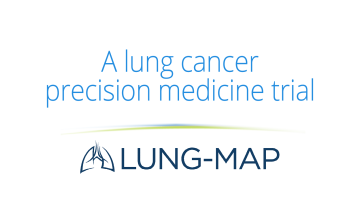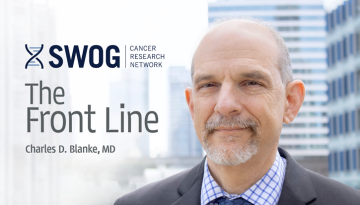Lung-MAP Nets TM Treasure
Underlying all effective research is clean data – what you know, what you don’t, where you can turn to get more information. Back in 2014, we launched our Lung-MAP precision medicine trial. Today, nearly seven years later, Lung-MAP has matured into a massive treasure trove of lung cancer data and biospecimens.
Blood and tissue samples have been collected on more than 3,000 patients, along with data from their clinical trial treatment. Creating this data set was one of the many reasons we joined with the National Cancer Institute, the Foundation for the National Institutes of Health, and Friends of Cancer Research to create Lung-MAP.
The lung cancer precision medicine trial, originally focused on finding new treatments for squamous cell lung cancer and now all non-small cell lung cancers, has partnered with 10 pharmaceutical and biotech companies to test 12 investigation drugs since its inception – or about two a year. That’s much faster than it takes to run a single-drug study – a benefit of operating under a master protocol, a cancer trial design Lung-MAP pioneered.
The Lung-MAP biospecimen bonanza was on display last week during the 2020 World Conference on Lung Cancer, held online Jan. 28-31. At the meeting, members of the Lung-MAP team – SWOG investigators Fred Hirsch, MD, PhD and Philip Mack, PhD, and Alliance investigator David Kozono, MD, PhD – presented translational medicine research findings that leveraged tissue and plasma samples banked by the trial.
Their work cast new light on the connection between tumor mutational burden and patient survival rates, uncovered a new role that the PARP4 gene may play in squamous cell lung cancer, and produced some encouraging results about the use of the liquid biopsy if patients can’t or won’t get a second tissue biopsy. To get all the details, read the press release here on Lung-MAP.org.
Hats off to Drs. Hirsch, Mack, and Kozono for their presentations, and to all our Lung-MAP leaders, including SWOG statistician Mary Redman, PhD, for her work on those translational studies and the trial design that spawned them.
Yesterday was World Cancer Day, and Lung-MAP is a reminder that science requires patience. While it took years to accumulate Lung-MAP specimens and data, this resource is now here for us all to wisely use in the service of people with cancer.
Other Recent Stories



